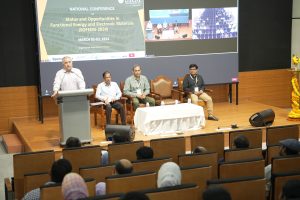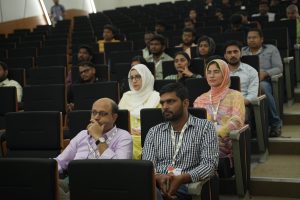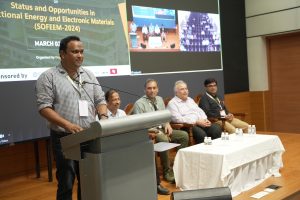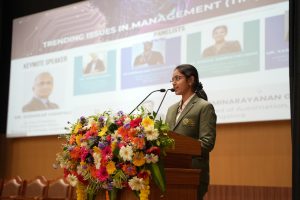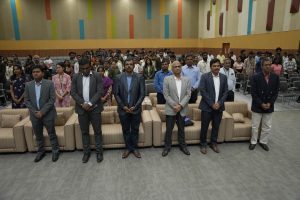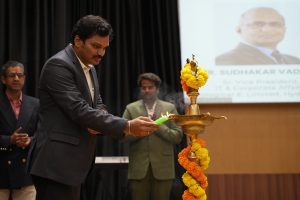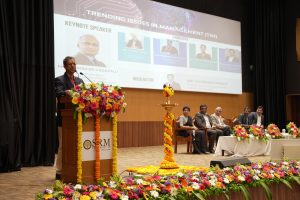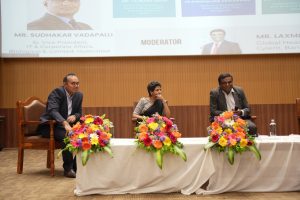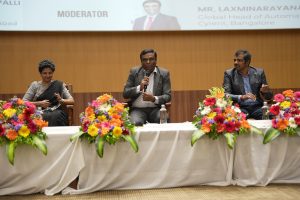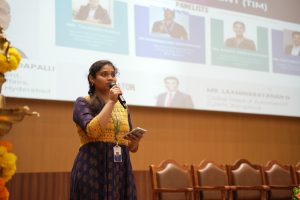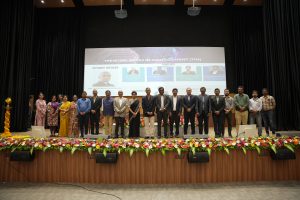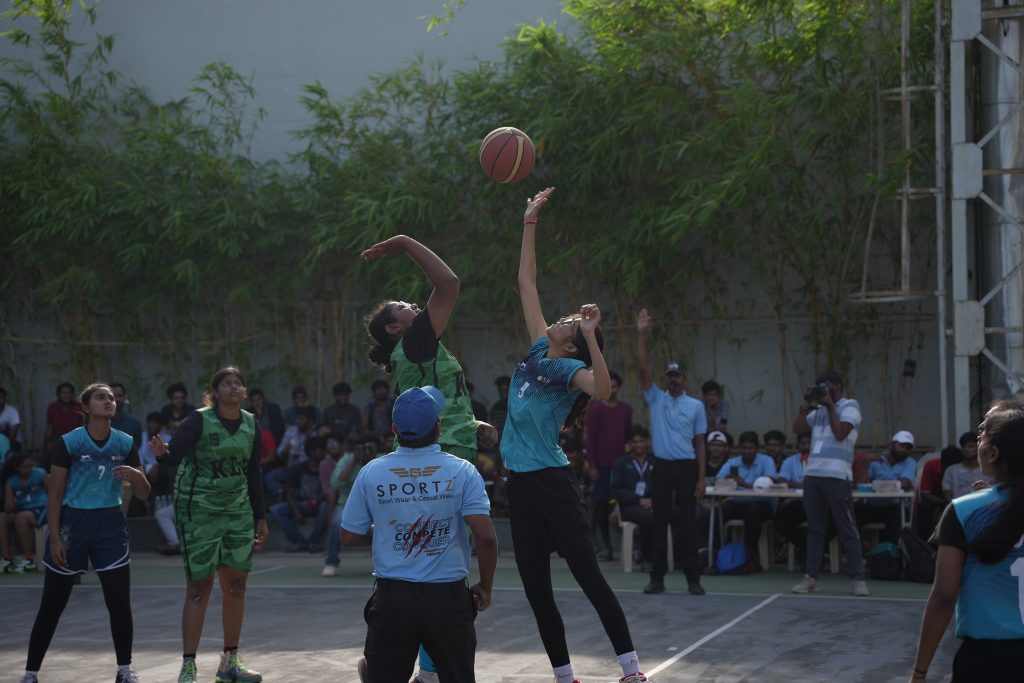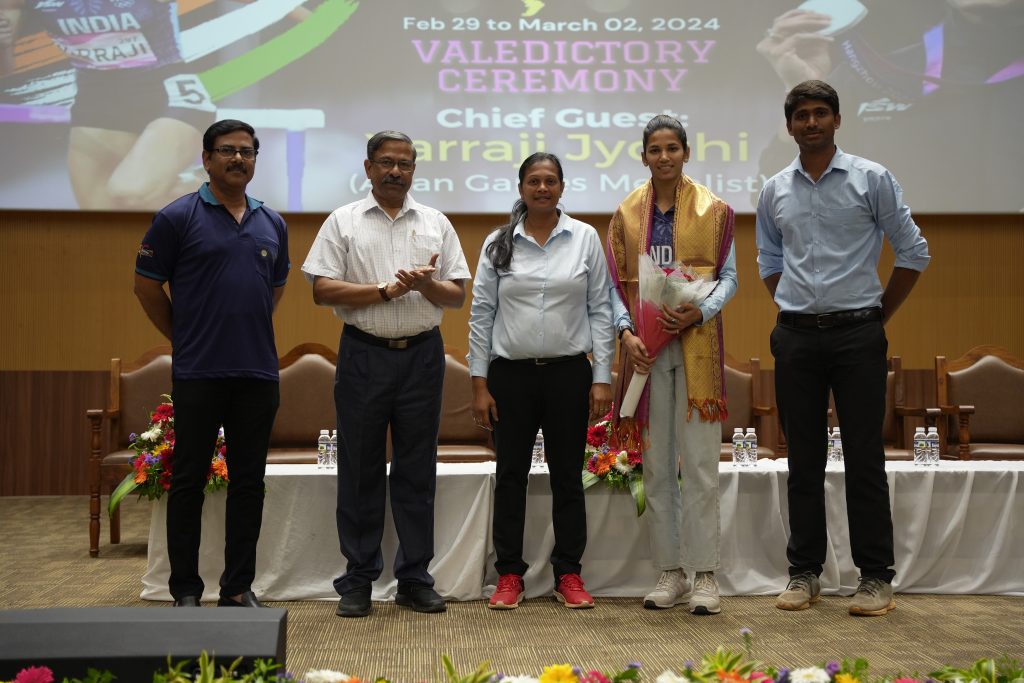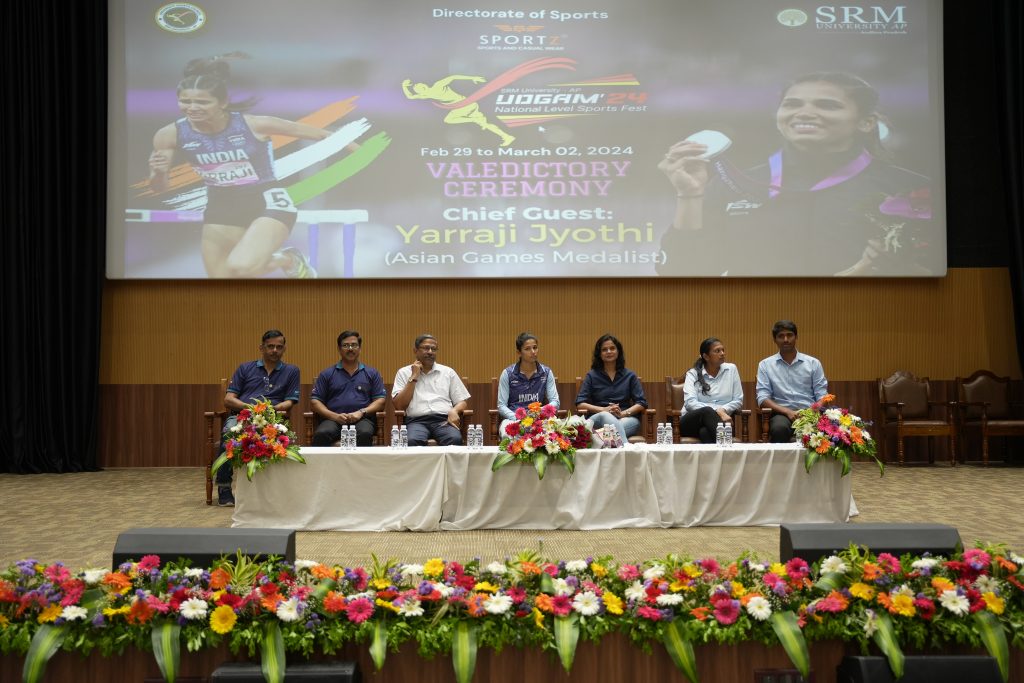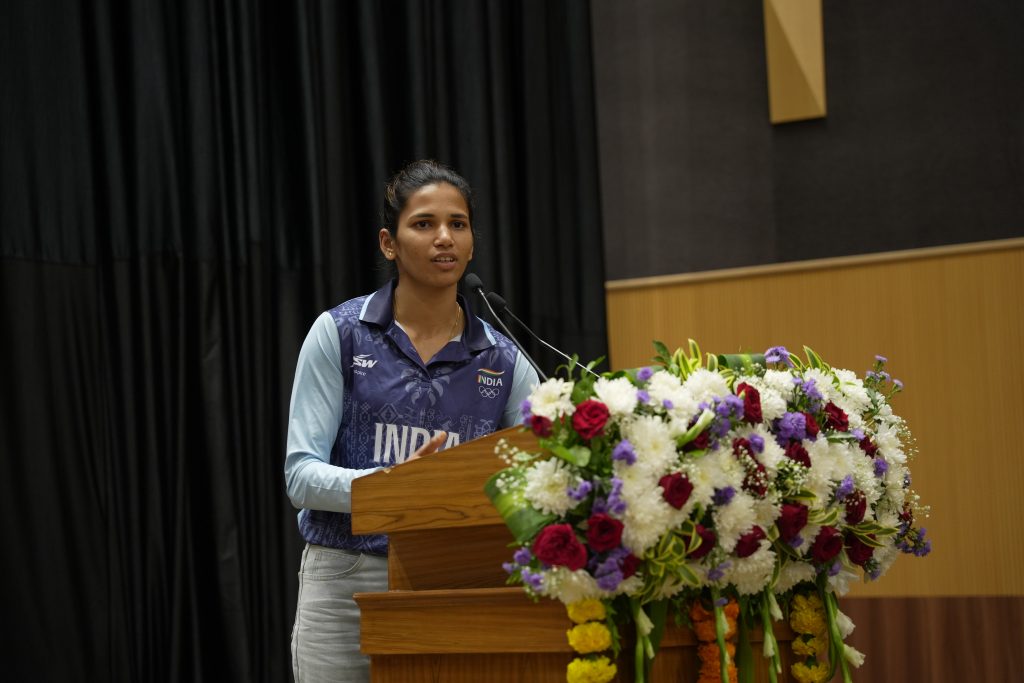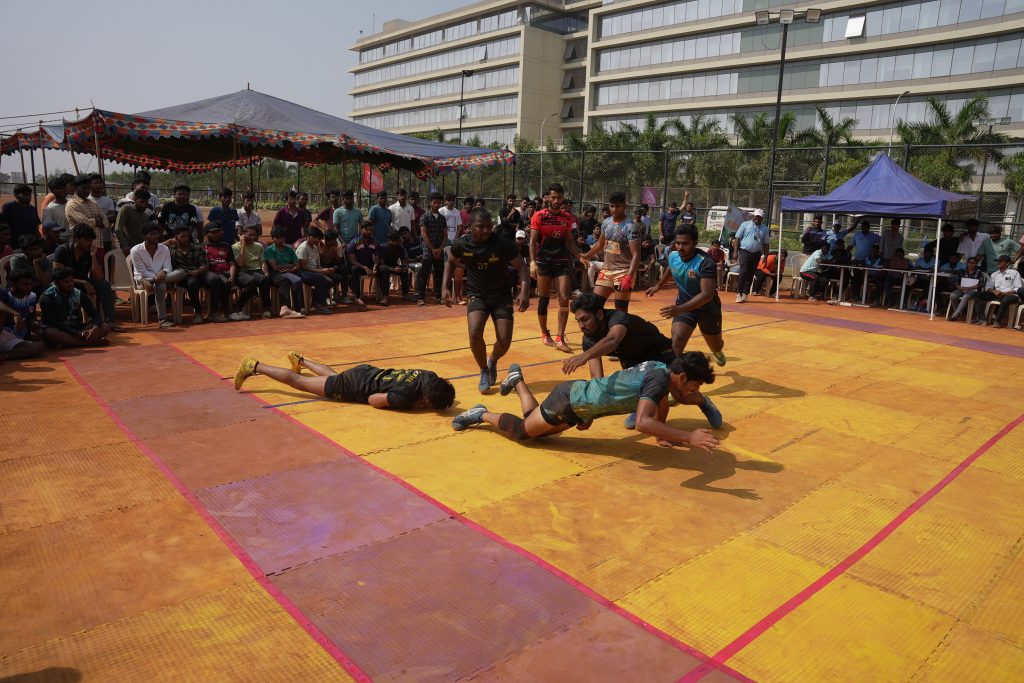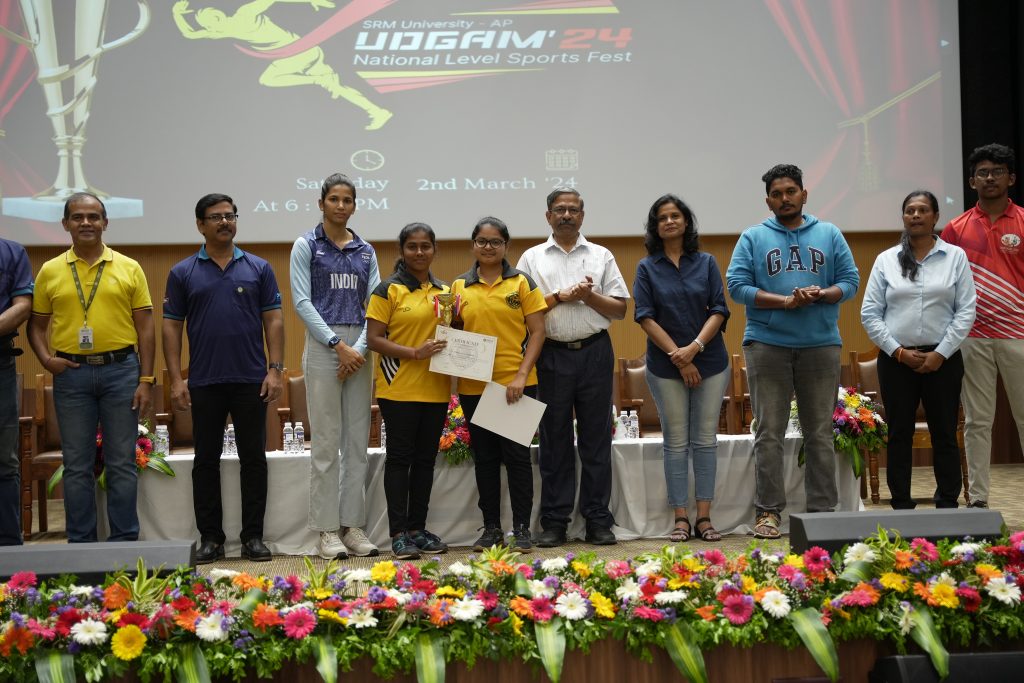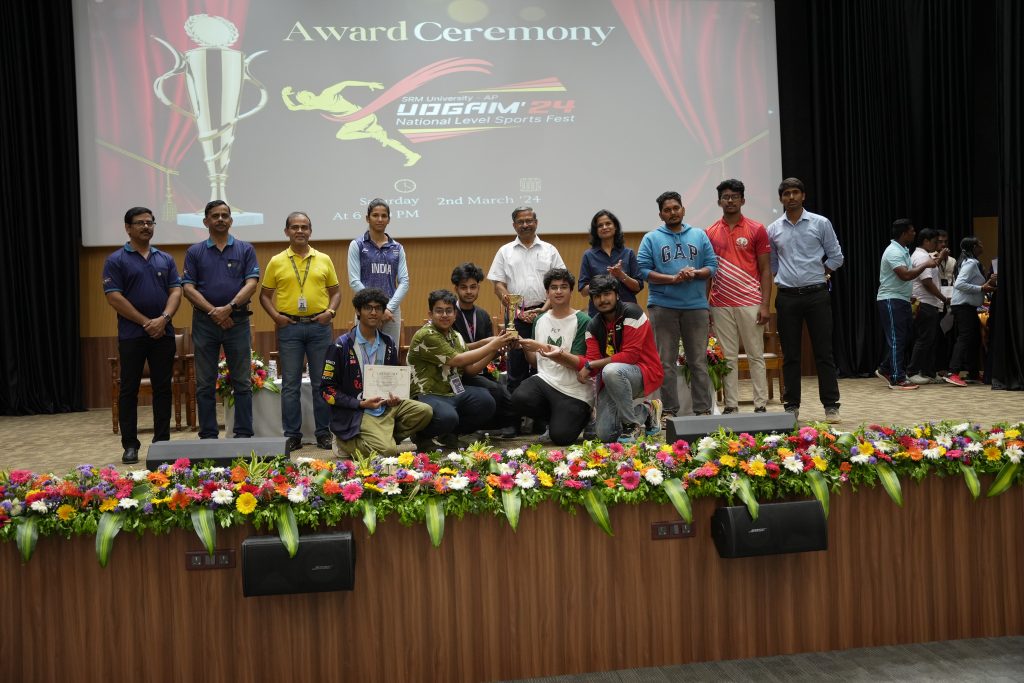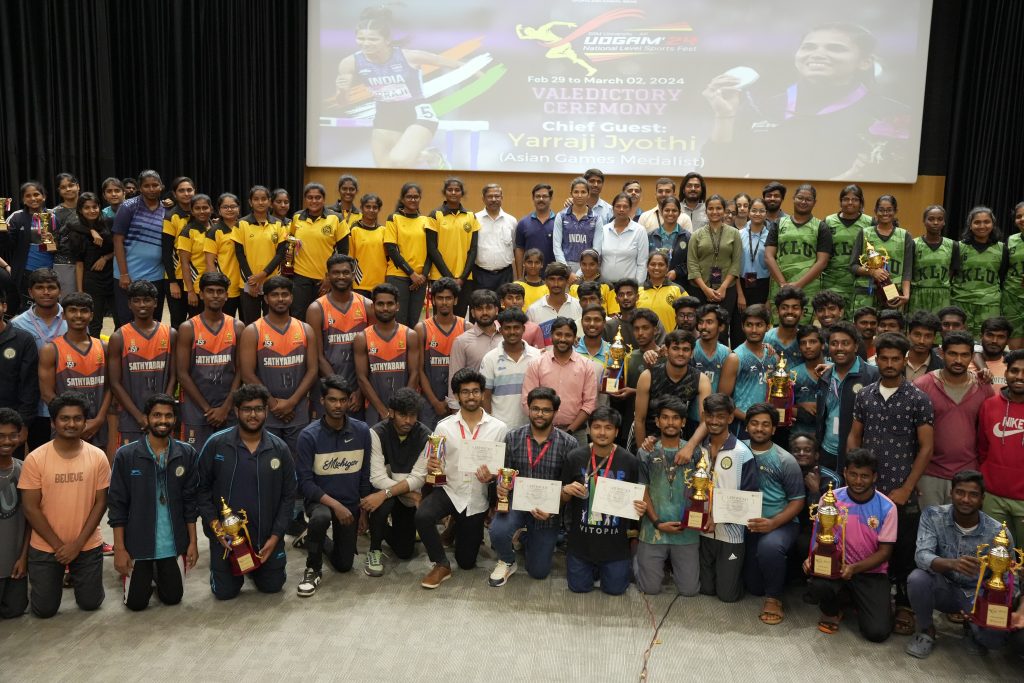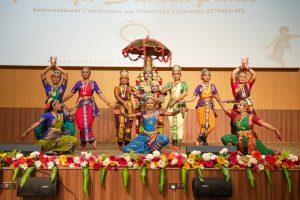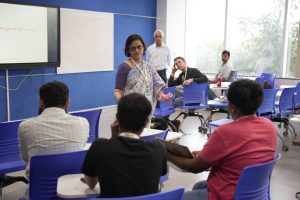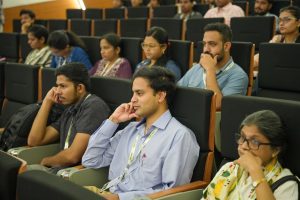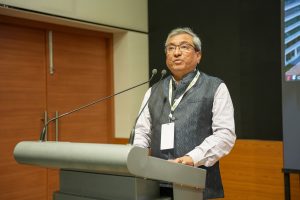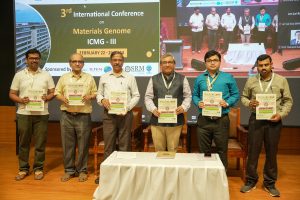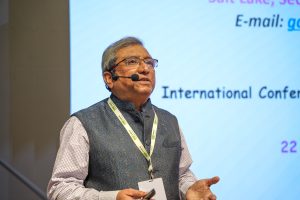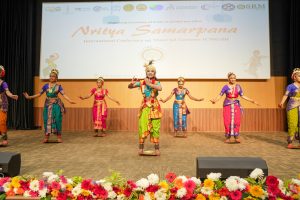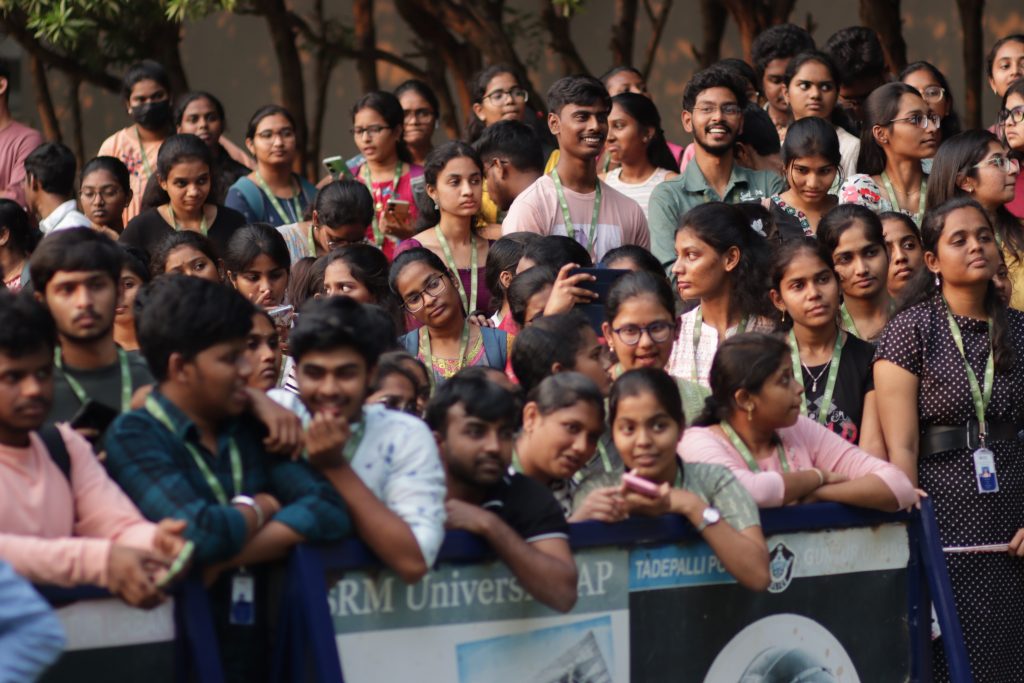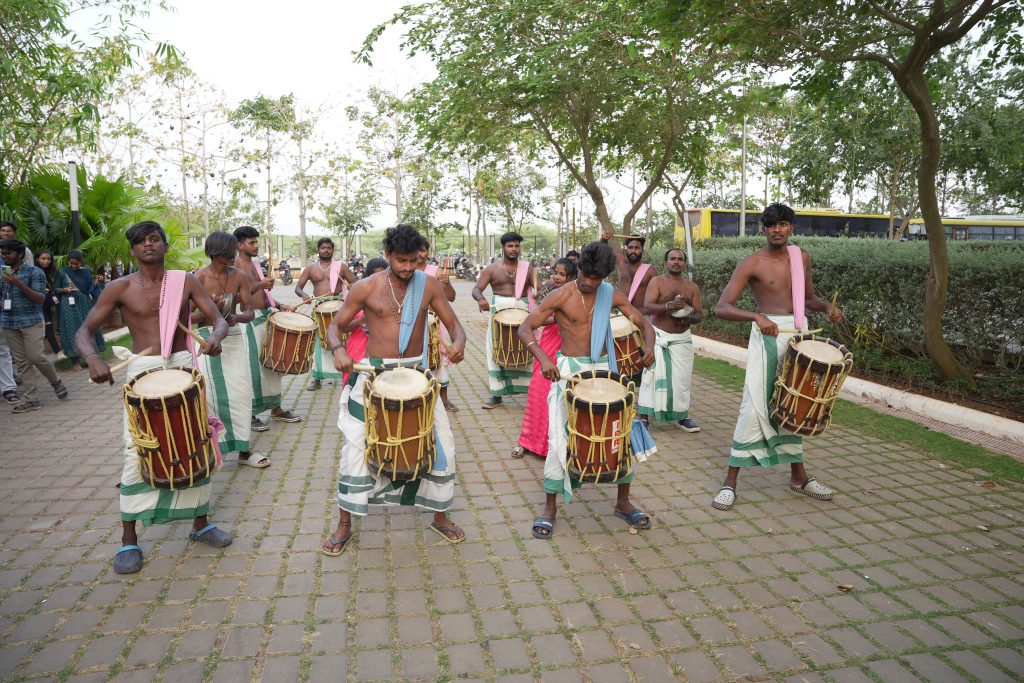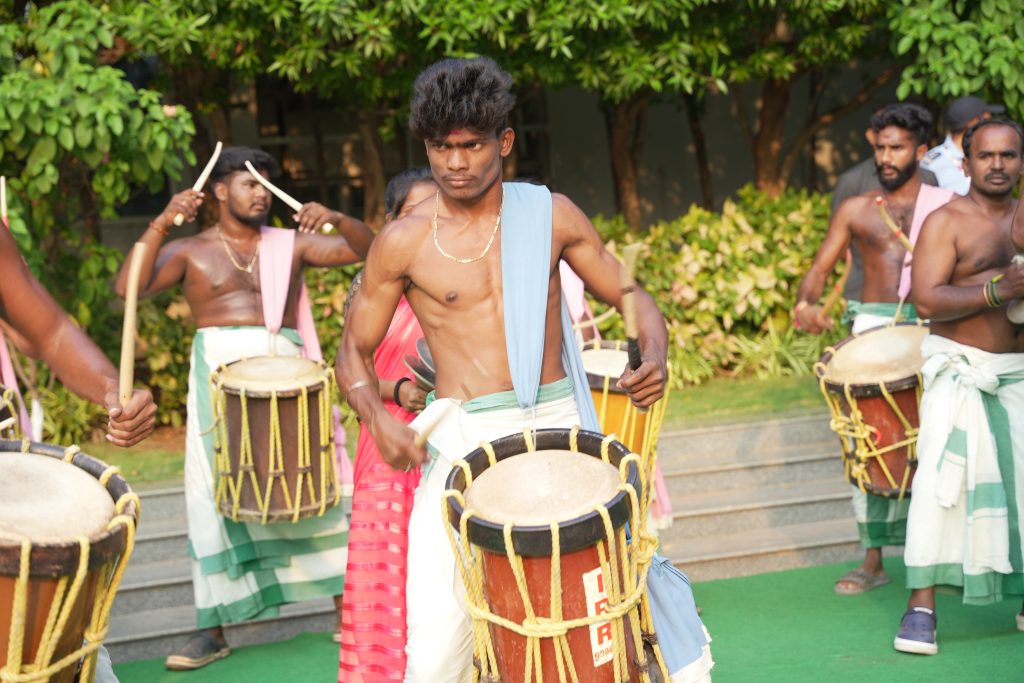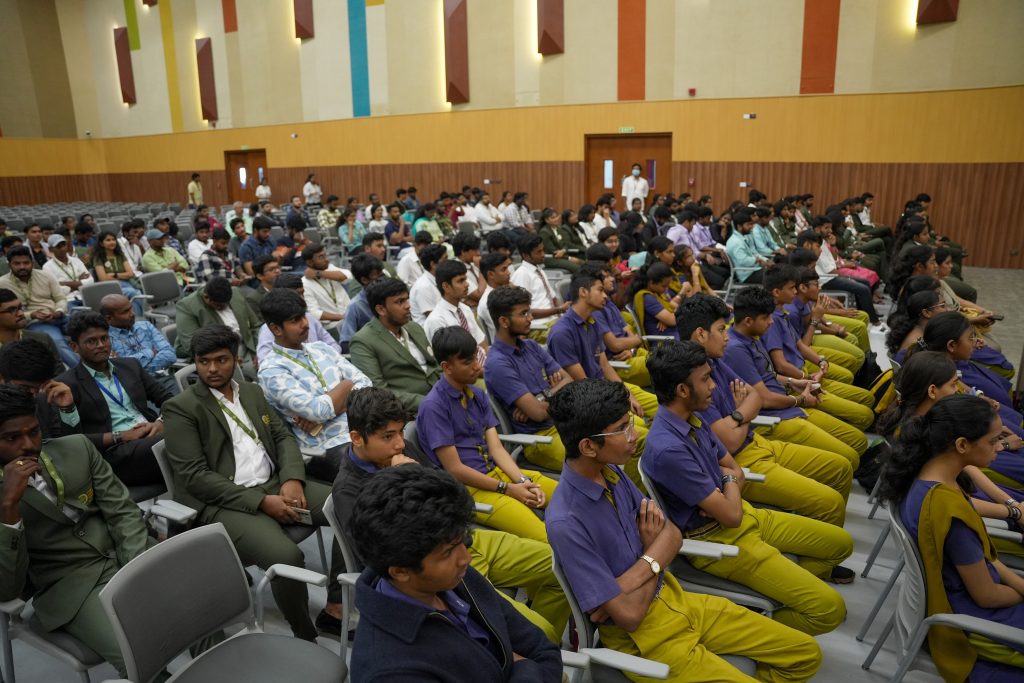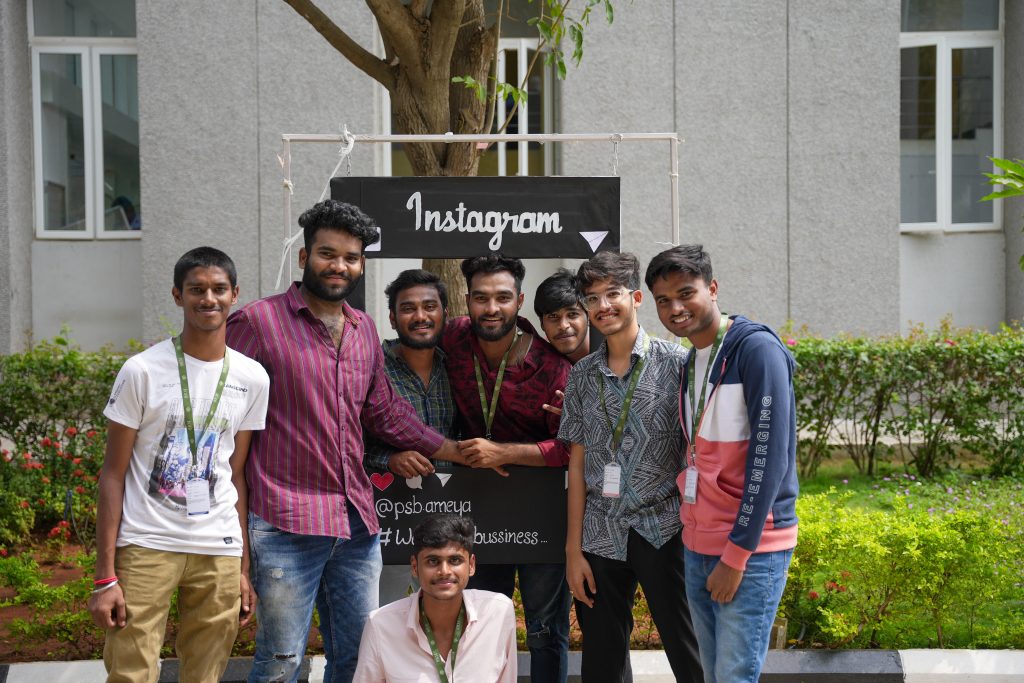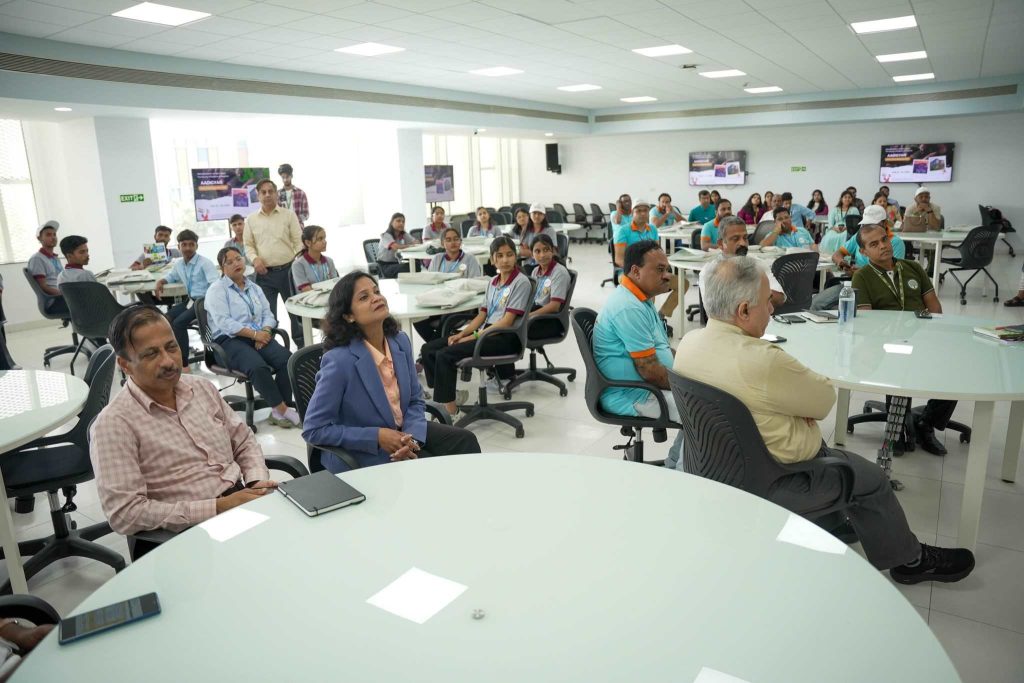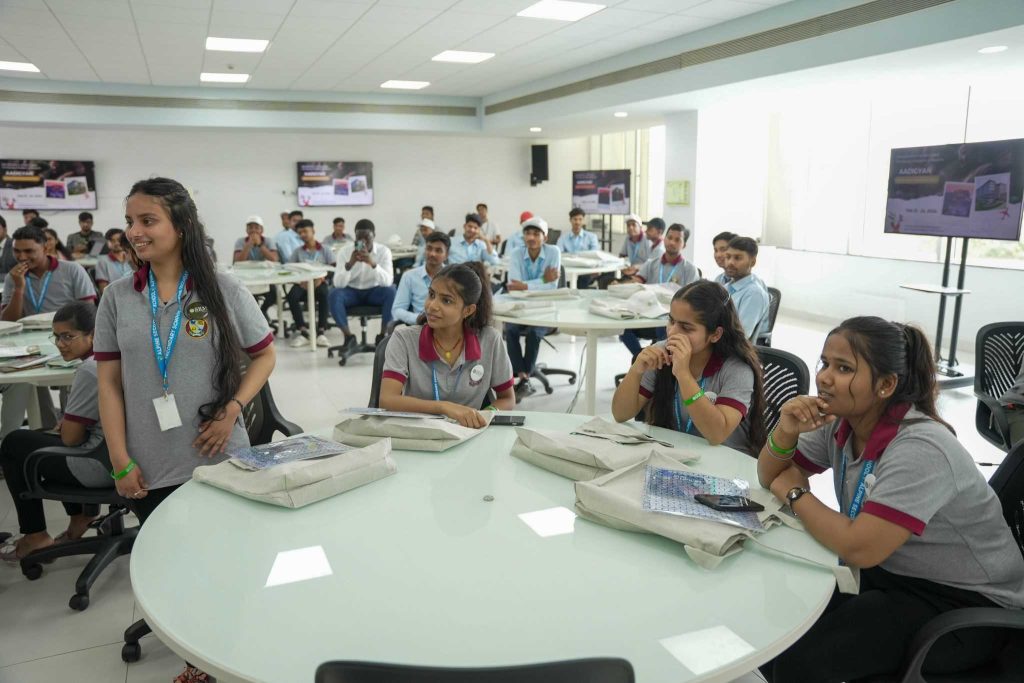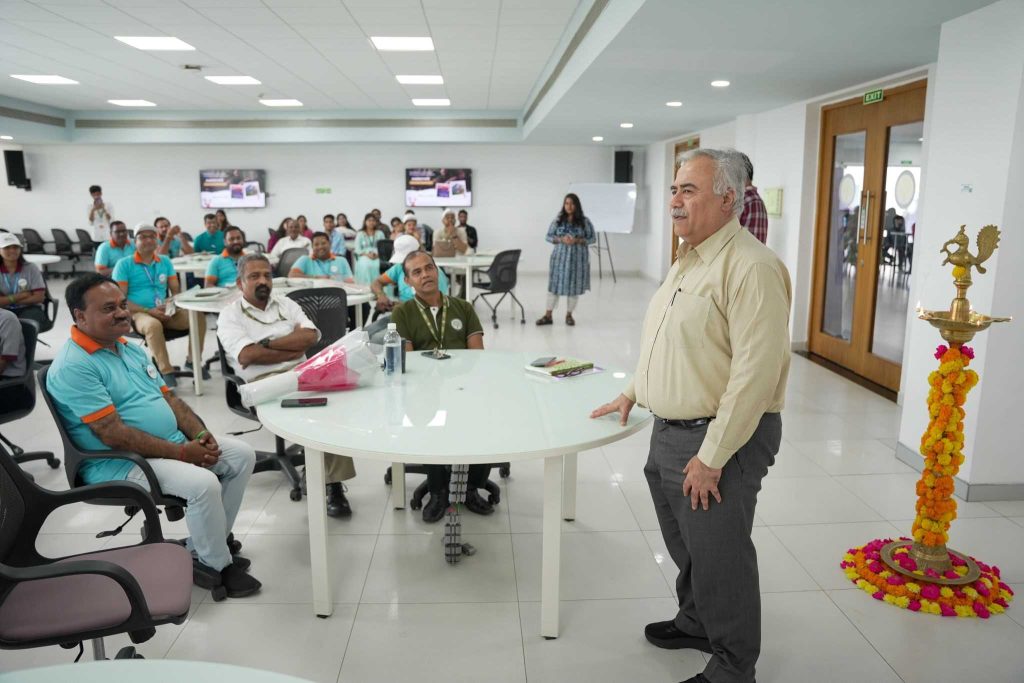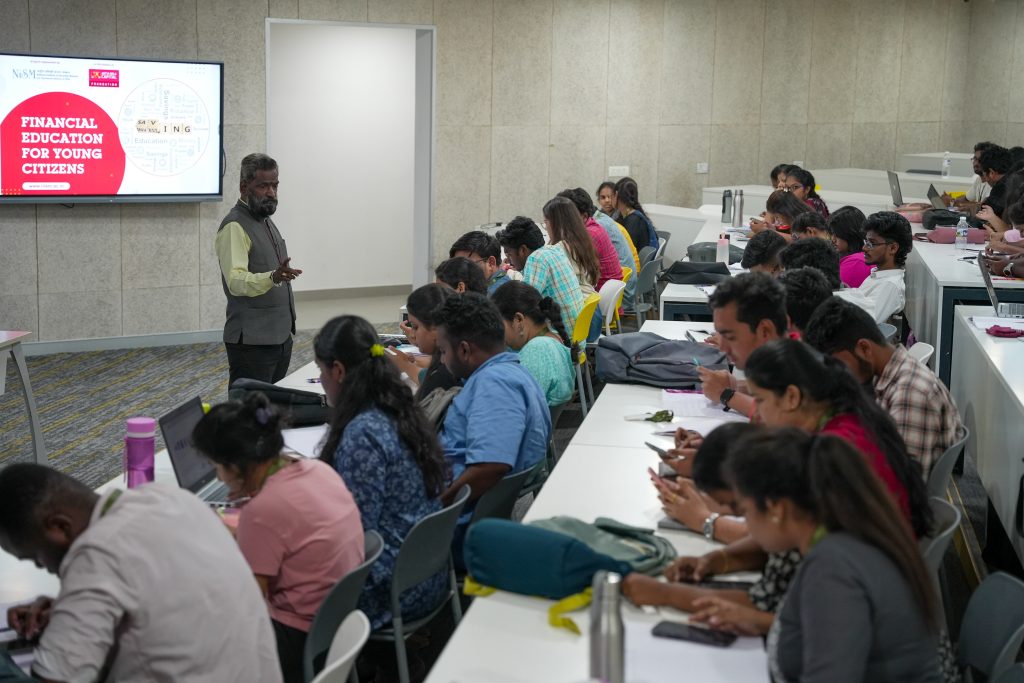Advances in Electric Vehicle Technology: A Study on Bi-Directional Converters
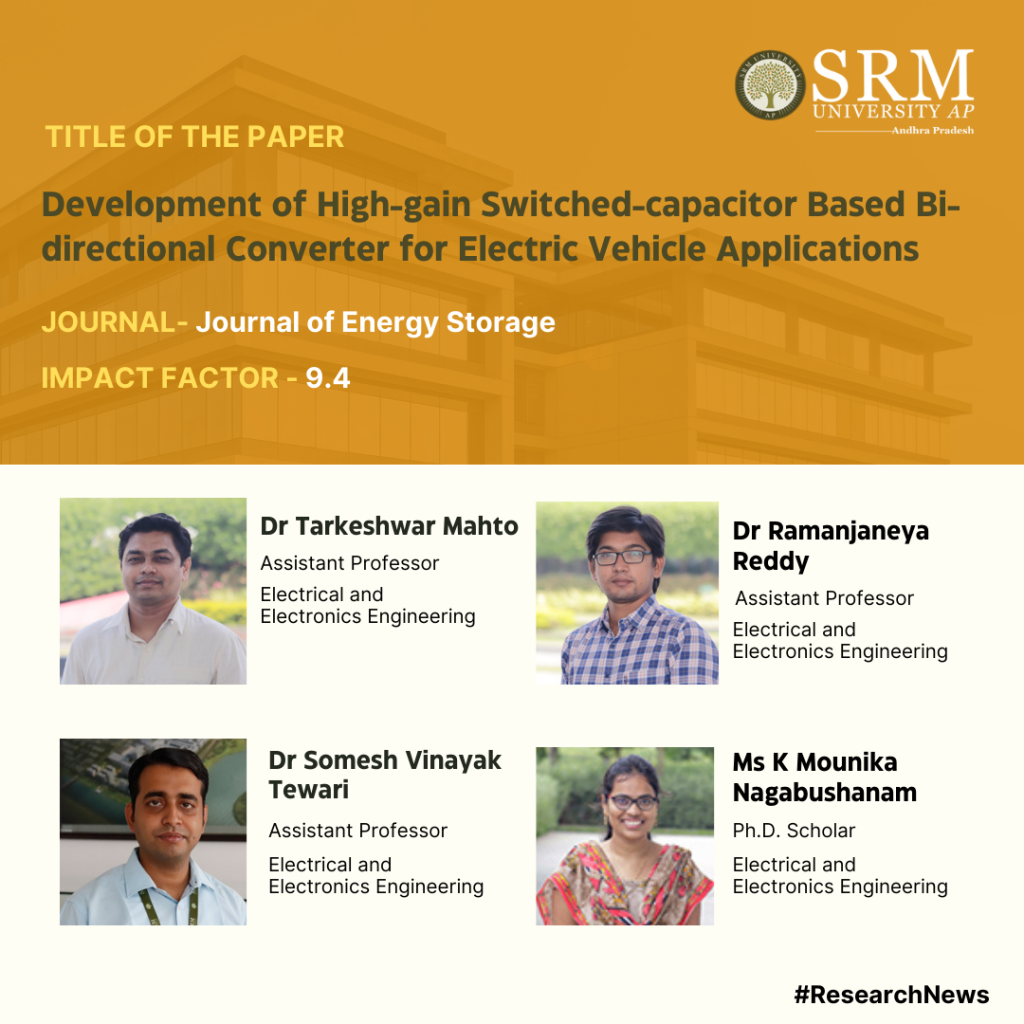
Electric Vehicles are in vogue today, thanks to the heightened environmental concerns, greater availability of models, increased cost competitiveness and improved vehicle ranges. To contribute to the growing field of electric vehicle technology, Assistant Professors, Dr Tarkeshwar Mahto, Dr Somesh Vinayak Tewari and Dr Ramanjaneya Reddy from the Department of Electrical and Electronics Engineering at SRM University-AP along with the research scholar, Ms K Mounika Nagabushanam, conducted a study and published a research paper titled “Development of High-Gain Switched-Capacitor Based Bi-Directional Converter for Electric Vehicle Applications.” The team’s research focuses on creating a bi-directional DC-DC converter that enables power flow from the battery to the motor and vice versa while maintaining necessary voltage gains and ensuring improved efficiency and low cost.
Abstract
High efficiency, high voltage transfer ratio (VTR), and low input ripple current are required in any bidirectional DC-DC converter (BDC) that plays a major role in interfacing batteries in applications like DC microgrids and electric vehicles (EVs). To meet these requirements, a switched capacitor-based BDC is proposed to interface the battery with a propulsion system via a DC Link. It has a simple circuit with only a set of switching operations, High VTR, and lesser ripple current on the low voltage (LV) side, which are advantages of the proposed High Gain Switched-Capacitor Bi-directional DC-DC Converter (SC-BDC), making it appropriate for use in EVs. The steady-state analysis, design consideration of passive components, loss and efficiency analysis are presented. Finally, the proposed High Gain SC-BDC is compared with a few of the existing BDCs in the literature. The feasibility of the converter was demonstrated by simulating a 200 W converter and validating results produced in a MATLAB environment.
Practical implementation of your research or the social implications associated with it.
The developed converter can be used in Electric Vehicle for integration of battery to traction motor.
Collaborations.
1. Majed A. Alotaibi, Department of Electrical Engineering, College of Engineering, King Saud University, 11421, Saudi Arabia.
2. Hasmat Malik, Department of Electrical Power Engineering, Faculty of Electrical Engineering, University Technology Malaysia (UTM), Johor Bahru 81310, Malaysia.
3. Fausto Pedro García Márquez, Ingenium Research Group, Universidad Castilla-La Mancha, 13071 Ciudad Real, Spain.
As part of their future research plans the team plans of working on noise reduction methods that are brought on by regeneration action and to incorporate various control techniques to keep the DC link voltage of the propulsion system constant.
We wish the team all success in their future endevours!
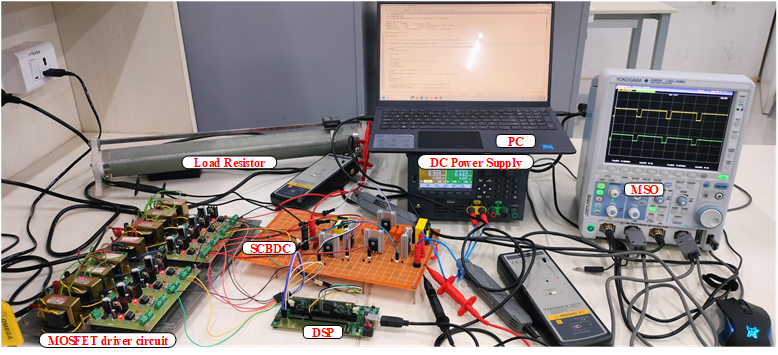
- Published in Departmental News, EEE NEWS, News, Research News
Unveiling Literary Insights on Salman Rushdie’s The Moor’s Last Sigh
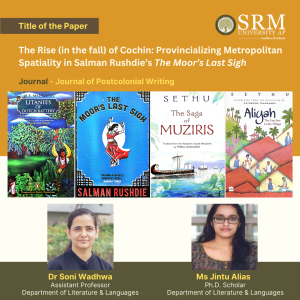 In a remarkable achievement, Dr Soni Wadhwa, Assistant Professor in the Department of Literature and Languages at SRM University-AP, and Ms Jintu Alias, a PhD Scholar, have made a significant contribution to the field of postcolonial studies with their paper titled “The rise (in the fall) of Cochin: Provincializing metropolitan spatiality in Salman Rushdie’s The Moor’s Last Sigh.”
In a remarkable achievement, Dr Soni Wadhwa, Assistant Professor in the Department of Literature and Languages at SRM University-AP, and Ms Jintu Alias, a PhD Scholar, have made a significant contribution to the field of postcolonial studies with their paper titled “The rise (in the fall) of Cochin: Provincializing metropolitan spatiality in Salman Rushdie’s The Moor’s Last Sigh.”
The paper, published in the highly esteemed Journal of Postcolonial Writing offering a fresh perspective on Salman Rushdie’s acclaimed novel, “The Moor’s Last Sigh.” Through their insightful analysis, Dr Wadhwa and Alias challenge the conventional notions of metropolitan spatiality and provide a nuanced understanding of the provincial city of Cochin.
Dr Soni Wadhwa and Jintu Alias, a promising PhD Scholar, have meticulously analysed Rushdie’s The Moor’s Last Sigh, shedding light on the complex dynamics of metropolitan spatiality and the rise and fall of Cochin within the narrative.
Their research explores Rushdie’s portrayal of Cochin, challenging traditional notions of metropolitan spaces and offering a fresh perspective on the provincial nation of such spatialities. This groundbreaking analysis delves deep into the layers of cultural, historical, and socio-political contexts within Rushdie’s work, showcasing the authors’ keen insights and critical thinking.
The publication of this paper highlights the invaluable contributions of our faculty and scholars in the field of literature and postcolonial studies. It is a testament to the rigorous academic environment and the commitment to excellence fostered at SRM University-AP.
We extend our warmest congratulations to Dr Soni Wadhwa and Jintu Alias for their remarkable achievement. Their dedication to research and passion for exploring the nuances of literature continue to inspire us all.
Explanation of the Research in Layperson’s Terms
Bombay/Mumbai is a great city widely celebrated in literature, especially for its cosmopolitanism. Salman Rushdie’s novel The Moor’s Last Sigh has been read by various critics for the richness of the portrayal of Mumbai. In their research, PhD scholar Jintu Alias and her PhD supervisor Dr Soni Wadhwa have analysed the representation of Cochin in the novel. Regarding their research they say, “For very long, Cochin’s presence has been eclipsed by that of Mumbai. But there is more to the novel than Bombay’s history. Like any art or literature, this novel is open to multiple interpretations. Our study is focused on the depiction of space in postcolonial literature with a focus on the island city Cochin in Kerala. When we immersed ourselves into the novel, we found that its charm is irresistible. Rushdie primarily opened a new city for other writers to explore. This novel was followed by several more novels that took an even closer look at the history of Cochin (now Kochi).”
Abstract
Indian fiction and critical engagements with it have a metropolitan bias. The preference for representations of big cities such as Mumbai in fiction means that non-metropolitan (“provincial”) spaces in India face neglect, literary and otherwise. This article argues for provincialising Indian fiction by exploring non-metropolitan locations as imagined in works of fiction to unpack alternative spatiality. The example offered is Salman Rushdie’s The Moor’s Last Sigh. In most readings of the novel, Bombay (along with Moorish Spain) is highlighted as a metropolitan model for India. Cochin does not figure in these readings, which are passed over as if just a random background or setting for the characters to be launched into Mumbai. This article addresses Cochin’s marginalisation by investigating how the island city offers a provincial, alternative, non-metropolitan theorisation of spatialities in Indian fiction. The larger objective is to make space for similarly marginalised non-European locales in the discourse of cosmopolitanism.
Social Implications
- We hope that with this interpretation of the novel from the point of view of Cochin and its history and cosmopolitanism, smaller cities in India get more attention from literary critics.
- We also hope that our research excites further studies and creative writing on other aspects of cultural traditions practised in smaller cities in India. There are many more themes and historical and geographical settings to explore in Indian literature!
Future Research
In continuation of our method of reading different Kochi texts, we will engage with more novels in the future. Our previous reading of another Kochi novel was published in Modern Jewish Studies in September 2023. We look forward to strengthening this body of work in the future.
About This Collaboration
PhD scholar Ms Jintu Alias and Assistant Professor Dr Soni Wadhwa have been working on this area of the Kochi novel since May 2021. This has been an exciting spatiality project in the context of Indian literature.
Citation
Alias, J., & Wadhwa, S. (2024). The rise (in the fall) of Cochin: Provincializing metropolitan spatiality in Salman Rushdie’s The Moor’s Last Sigh. Journal of Postcolonial Writing, 1-13. https://doi.org/10.1080/17449855.2024.2307408
- Published in Departmental News, English Current Happenings, News, Research News
SOFEEM-2024: A National Conference on Functional Energy and Electronic Materials
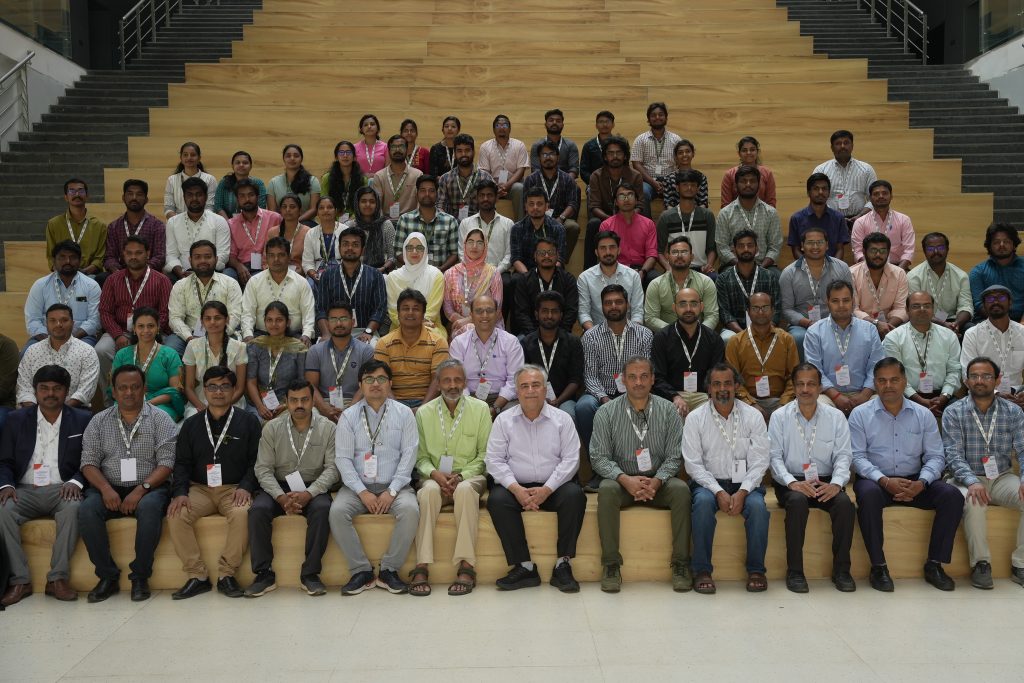
SRM University-AP hosted a national conference on “Status and Opportunities in Functional Energy and Electronic Materials” (SOFEEM-2024) on March 02-03, 2024. The conference was organised by the Department of Physics and was supported by the Department of Science and Technology, Government of India. The conference brought together about 100 participants from various reputed institutions, national laboratories, and universities from India. They shared their research outcomes and discussed the various frontier energy technologies and smart electronic devices.
The main theme of the conference was to boost the development and optimal use of renewable energy and to promote sustainable energy and intelligent electronics. The conference focused on fostering collaboration among researchers and practitioners to explore cutting-edge developments in these domains and pave the way for innovative solutions. A diverse array of topics was covered, including:
- Synthesis and processing of novel energy and electronic materials
- Modelling of low-dimensional materials
- Materials and catalysts for green hydrogen production
- Electrolyte and electrode materials for high-performance batteries and fuel cells
- Functional materials for supercapacitors
- Device fabrication using novel energy materials for energy conversion and storage
- Low-dimensional materials in electronics and photonics
The conference was inaugurated by Prof. Manoj K Arora, Vice Chancellor, who welcomed the guests and the delegates and highlighted the university’s achievements and vision. He also emphasised the importance of interdisciplinary research and innovation in addressing the global energy and environment challenges.
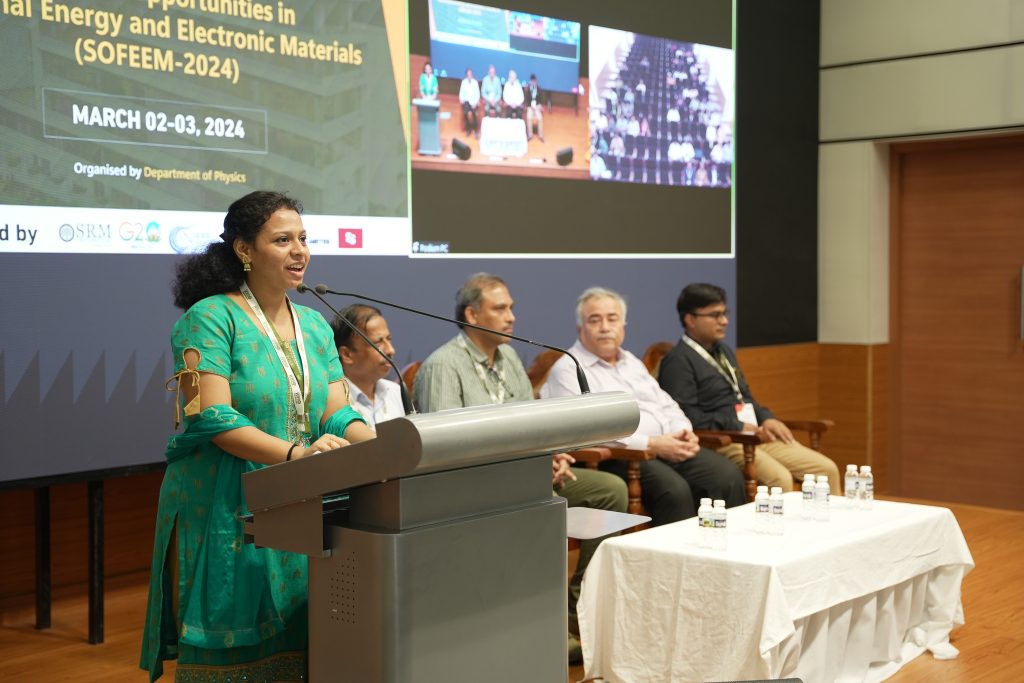
The conference featured keynote lectures, invited talks, oral presentations, and poster sessions by experts and young researchers. Distinguished Keynote speakers from IIT Madras, along with Invited speakers from prestigious institutions such as the Indian Institute of Science (IISC) Bangalore, IIT Tirupati, IIT Hyderabad, University of Hyderabad, IISER Bhopal, and the CSIR – Central Electrochemical Research Institute (CECRI) in Tamil Nadu, among others from esteemed state universities, shared their groundbreaking research. The conference provided a good platform for the participants to interact with the eminent researchers to enrich and share their knowledge in their respective fields of research and engage in potential collaboration to develop innovative technologies in the areas of sustainable energy, advances in materials research and computational sciences. In addition, research scholars from nearby universities (such as VIT-AP, Vignan University, Acharya Nagarjuna University, and SRM-IST) participated in the conference and showcased their current research works.
The conference concluded with awards for the best poster and oral presentation by research scholars, celebrating their significant contributions to the field. The conference concluded with a valedictory session, where the best oral and poster presentations were awarded, and feedback from the participants was collected. The conference was well-received by the attendees, who appreciated the quality and diversity of the scientific discussions, as well as the university’s hospitality and facilities.
- Published in Departmental News, News, Physics News
A Pathbreaking Cross Between Medicine and Technology
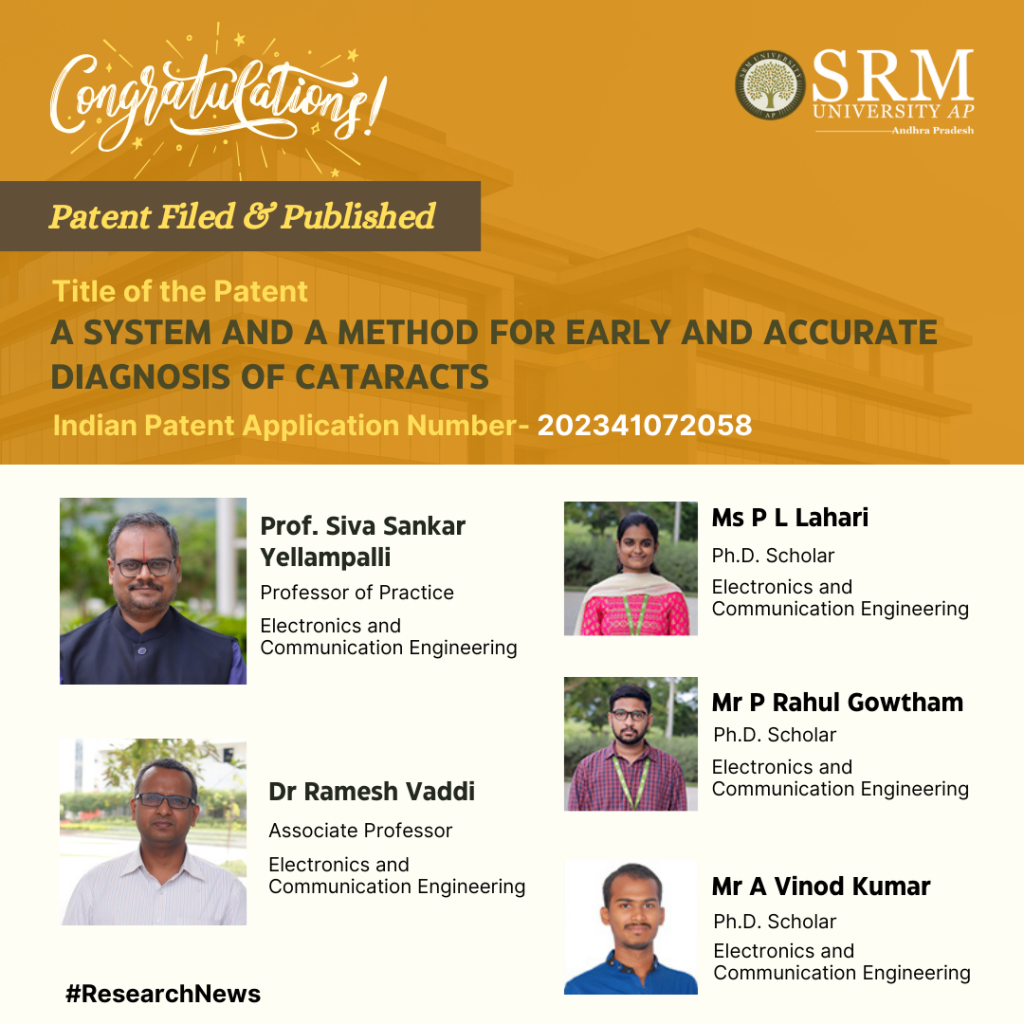
The advent of scientific research and technologies in the domain of medicine has recently taken limelight due to its immense benefit on humankind and the medical community. The expert faculty and scholars have recently published a patent, “A System and a Method for Early and Accurate Diagnosis of Cataracts” with Application no.: 202341072058 has put forth an engaging invention on utilising technology for early cataract recognition. Hearty congratulations to Prof. Siva Sankar Yellampalli, Professor, Dr Ramesh Vaddi, Associate Professor, and their Ph.D. Scholars Ms P L Lahari, Mr P Rahul Gowtham, and Mr A Vinod Kumar from the Department of Electronics and Communication Engineering for this groundbreaking achievement!
Abstract
Cataracts are a common eye condition in which the lens of the eye gets clouded, impairing vision. Early cataract detection is crucial for prompt treatment and vision preservation. We have classification and prediction algorithms like VGG, ResNet, DenseNet, Xception, Inception, and other object detection techniques like Yolo, Fast R-CNN, and SSD. Various pre-trained models are employed for cataract categorisation and prediction. Several attempts to detect cataracts have been made, but none have proven effective. A clinical examination by eye specialists is used to diagnose cataracts. An edge board can be used instead of a clinical examination to diagnose cataracts.
We created a method for real-time cataract recognition using the present pre-trained weights of the object detection model YoLoV5. We employ pre-trained YoLo V5 weights for model training, testing, and validation. Connect the Jetson Nano board and Lenovo HD USB camera to the CPU, which serves as the CPU. The monitor is used for programming, and the output is presented on the monitor owing to the board communicating with the camera. The result shows the image with an eye labelling box that tells if the eye is normal or cataract.
- Published in Departmental News, ECE NEWS, News, Research News
PSB Hosts First Edition of Trending Issues in Management with Focus on AI
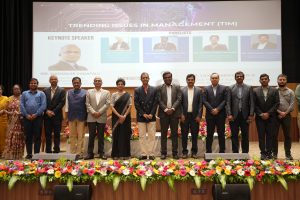 In a landmark event that marked the first edition of “Trending Issues in Management,” Paari School of Business at SRM University-AP brought together a stellar lineup of industry stalwarts to delve into the transformative world of Artificial Intelligence (AI). The conference aimed at unravelling the complexities, exploring the opportunities, and addressing the challenges posed by AI in the ever-evolving landscape of modern management.
In a landmark event that marked the first edition of “Trending Issues in Management,” Paari School of Business at SRM University-AP brought together a stellar lineup of industry stalwarts to delve into the transformative world of Artificial Intelligence (AI). The conference aimed at unravelling the complexities, exploring the opportunities, and addressing the challenges posed by AI in the ever-evolving landscape of modern management.
The event featured an elite panel of speakers, including Mr Sudhakar Vadapalli, Senior Vice President IT and Corporate Affairs, Biological E. Limited, Hyderabad, Saurabh Singh, Senior Vice President, Global Delivery Leader, Polestar Solutions, Delhi, Shriram Vasudevan (FIE, FIETE, SMIEEE), Technical Evangelist, Intel India Pvt Ltd, Bangalore, Laxminarayanan G, Global Head of Automation, Cyient, Bangalore, Karthiban Pandiyan MBB® PMP®, Leader Process Excellence, PwC India, Bangalore, and Ramya Sampathkumar, Independent Consultant and ex-Chief Digital Officer, Chennai.
They were joined by SRM AP’s esteemed members, Dr R Premkumar, Registrar, Prof. Bharadhwaj Sivakumaran, Dean of Paari School of Business, Dr CA Mahalakshmi Mudliar, and Mr Arun Prasad, offering a rich blend of theoretical insights and practical perspectives on AI’s impact on management.
Prof. Bharadhwaj Sivakumaran set the tone in his welcome speech, emphasising the school’s commitment to embedding Quality, Innovation, Customer-Centric Approach, and Ethics into its curriculum. “Our aim is to provide students with a contemporary education that is at the forefront of industry trends, particularly in AI and Blockchain, ensuring they are market-ready,” he stated.
Truly, considering the advent of technology in recent times, Paari school of Business is the first B-School in the country to include Artificial Intelligence and Blockchain as compulsory courses. It is also first in launching a Certificate Programme in Artificial Intelligence and Generative AI in Marketing.
Keynote speaker Sudhakar Vadapalli captivated the audience with his exploration of AI’s evolution, referencing Howard Gardner’s definition of intelligence and highlighting the rapid advancements leading to today’s sophisticated Large Language Models like ChatGPT. “The journey from Turing’s initial concepts to today’s AI showcases a trajectory towards an intelligence that might one day parallel human cognition,” Vadapalli remarked.
The subsequent panel discussion was a deep dive into AI’s role in reshaping management, highlighting the technology’s potential to enhance efficiency, innovate decision-making processes, and foster continuous learning and adaptation. Yet, the experts also cautioned about the challenges, particularly concerning data privacy, security, and the ethical use of AI.
The consensus among the panellists was clear: AI is not a fleeting trend but a fundamental shift reshaping the business landscape. Embracing this change requires new skills, such as Prompt Engineering and a proactive approach to the ongoing developments in AI technologies.
This seminal event underscored the importance of AI in contemporary management and positioned the Paari School of Business as a pioneering institution committed to integrating cutting-edge technologies into its academic fabric, preparing a new generation of leaders ready to navigate the AI-driven future.
- Published in Departmental News, News, Paari Current Happenings
SRM University-AP Successfully Hosts UDGAM-’24, Celebrating National Sportsmanship
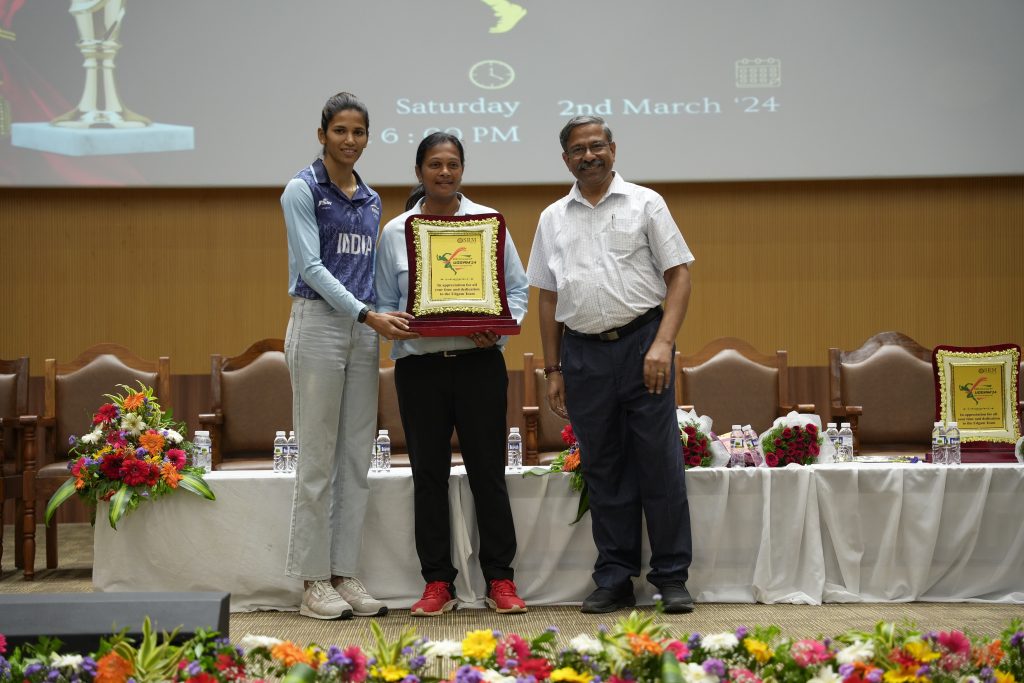
SRM University-AP, the proud organiser of the national-level sports event UDGAM-’24, graciously hosted a spectacular display of talent and sportsmanship on its grounds, wrapping up with a heartfelt closing ceremony on Saturday, March 2, 2024. The event, which commenced on February 29, was a testament to the spirit of unity and competitive excellence, with teams from across the nation showcasing their prowess in cricket, kabaddi, and volleyball.
The university extends its warmest congratulations to all the participating teams, especially highlighting the commendable performances of the Guntur Kits Engineering College cricket team, the kabaddi players from Amritasai Engineering College, and the volleyball teams from Saint Ann’s College and Mohan Babu University. Their dedication, skill, and sportsmanship have been the true highlights of this event.
SRM University-AP‘s grounds were alive with enthusiasm and energy, as athletes from various institutions came together to push their limits and celebrate the true spirit of sports. The cricket final was a particularly memorable moment, with the teams displaying exceptional talent and teamwork. The kabaddi and volleyball matches were equally riveting, filled with moments of sheer determination and exemplary skill.
The closing ceremony was a moment of unity and celebration, with Asian Games silver medalist Ms Jyothi Yerraji gracing the occasion to award the trophies to the deserving winners. The university’s registrar, Dr R Premkumar, led the event, emphasising the values of sportsmanship and camaraderie that Udgam- ’24 aimed to promote. The university also took the opportunity to express its gratitude towards all the participants, coaches, and supporting staff who contributed to the success of this grand sporting festivity.
In a humble acknowledgement of the collective effort, the university’s administration, including Dr Prem Kumar and Mr Anil Nigam, Director-Student Affairs, honoured the chief guest and all the participating athletes, appreciating their hard work, spirit, and the joy they brought to the SRM University-AP campus.
As we close this chapter of Udgam-24, SRM University-AP looks forward to fostering a continued legacy of sportsmanship, encouraging healthy competition, and nurturing the talents of young athletes from across the nation. We are inspired by the passion exhibited by all teams and are proud to have provided a platform for such a dynamic and inspirational exchange of athleticism and goodwill.
- Published in Departmental News, News, Sports News, University Event
3rd ICMG Inauguration: Emerging Interfaces in Materials Genome
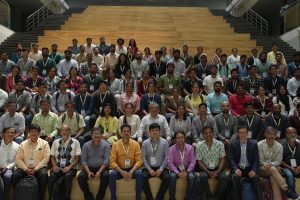 The third chapter of the biennial International Conference on Materials Genome (ICMG) was inaugurated at SRM University-AP, India on February 22, 2024, in the august presence of Prof G P Das, Research Institute for Sustainable Energy, India, Prof Yoshiyuki Kawazoe, Tohoku University, Japan, Prof Puru Jena, Virginia Commonwealth University, USA, Prof Jer Lai Kuo, Dr R Premkumar, Registrar, SRM University AP, Prof Ranjit Thapa, Dean-Research, Dr Pranab Mandal, Associate Professor & Head of the Department, Physics, Dr Mahesh Ravva, Associate Professor, Chemistry, Dr Pradyut Kumar Sanki, Associate Professor, Electronics and Communication Engineering and 150+ dignitaries across the world.
The third chapter of the biennial International Conference on Materials Genome (ICMG) was inaugurated at SRM University-AP, India on February 22, 2024, in the august presence of Prof G P Das, Research Institute for Sustainable Energy, India, Prof Yoshiyuki Kawazoe, Tohoku University, Japan, Prof Puru Jena, Virginia Commonwealth University, USA, Prof Jer Lai Kuo, Dr R Premkumar, Registrar, SRM University AP, Prof Ranjit Thapa, Dean-Research, Dr Pranab Mandal, Associate Professor & Head of the Department, Physics, Dr Mahesh Ravva, Associate Professor, Chemistry, Dr Pradyut Kumar Sanki, Associate Professor, Electronics and Communication Engineering and 150+ dignitaries across the world.
ICMG is set up to nurture and promote research and development activities in computational materials in association with Asian Consortium on Computational Materials Science (ACCMS), Jawaharlal Nehru Centre for Advanced Scientific Research, Bangalore (JNCASR), National Chemical Laboratory, Pune (NCL), Virginia Commonwealth University, USA, Indian Institute of Technology, Madras (IIT-M), Indian Institute of Technology, Bombay (IIT-B), TCG-Crest, Kolkata.
In his inaugural speech, Dr R Premkumar delved into the vision of SRM University-AP as a new-age research-centric university. Within 7 years of inception, SRM University-AP proudly harbours 20 departments across 3 schools, providing education to 8500 students. The university aspires to bring quality education to 15000 students in the near future. The research environment of the university is no less than excellent. The university strives to contribute to society through outstanding research activities. The premier faculty pool of the university with 100% PhD and international academic and industry exposure and the zeal to do quality research makes it a chosen haven for achievers. SRM University-AP supports its faculty and students in research by providing Seed Funding, Research Grants, Financial Assistance for Publications and Patents, Conference Aids and state-of-the-art research facilities. “The university’s mission is to create a newer generation who could substantially contribute to the academia and industry. Hence, we encourage our students with equal importance to take entrepreneurship, higher studies and/or Placement support as their future endeavours”, said Dr R Premkumar.
In his keynote speech, Prof. G P Das congratulated the University for the successful arrangement of the 3rd International Conference on Materials Genome. In the year 2000, the Asian consortium was born from a tea table discussion and has come a long way since. This consortium has become 25 years old, and they have been utilizing human as well as computational resources in different countries in the Asian region. The year 2024 marks the 60th year of the two most important milestone developments in the field of materials simulation – (i) Density Functional Theory by Walter Kohn and (ii) the landmark paper by Aneesur Rahman who is considered the founding father of computer simulation and molecular dynamics. It is exciting to note how the research in this domain has evolved in the years between. “One of the most recent additions to this is the marriage between materials science and computer science. This is also termed materials informatics or materials genomics. Big data, deep neural networks, reinforcement learning etc. are becoming more and more familiar tools for materials physicists and chemists. An increasingly large number of papers are appearing in the most prestigious peer-reviewed journals on the data-centric approach to discover as well as predict novel energy materials, catalytic materials, magnetic & spintronic materials, various kinds of functional materials and more recently topological materials,” asserted Prof Das.
Prof. Das further emphasised that there are a large number of areas that are being investigated with the aid of modern technologies like AI-ML. For example, the space group of a complex geological sample can be predicted just by looking at its X-ray or Neutron diffraction data using deep neural networks which was conventionally used to be done by Rietveld analysis, but now such inverse problems can be dealt with AI-ML. Such data-centric pattern-recognition approaches and their triumphs in predicting the behaviour of hitherto unknown areas e.g. cryptography, agriculture, and even criminology open up a bright new future ahead of us. Prof. Das concluded his speech by reminding us that we are now far ahead of our conventional ways of studying. The emerging ‘interface areas’ between disciplines such as biology and physics, economics & physics, metallurgy & physics, electronics & physics, mathematics & statistics, and many other suggests an enormous leap in computational approaches with advances in experimental measurements.
The Sub-themes of the conference for this year are Quantum Mechanics/Machine Learning Approach, High-throughput Computation and Machine Learning aided discovery of Materials, on which 6 keynote speeches and 46 invited lectures will be delivered in the coming 3 days. It is indeed heartening to see the conglomeration of so many stalwarts covering broad areas in Physics, Chemistry and Materials Science.
- Published in Departmental News, News, Physics News
Ameya’24 – Igniting Minds, Fostering Innovation
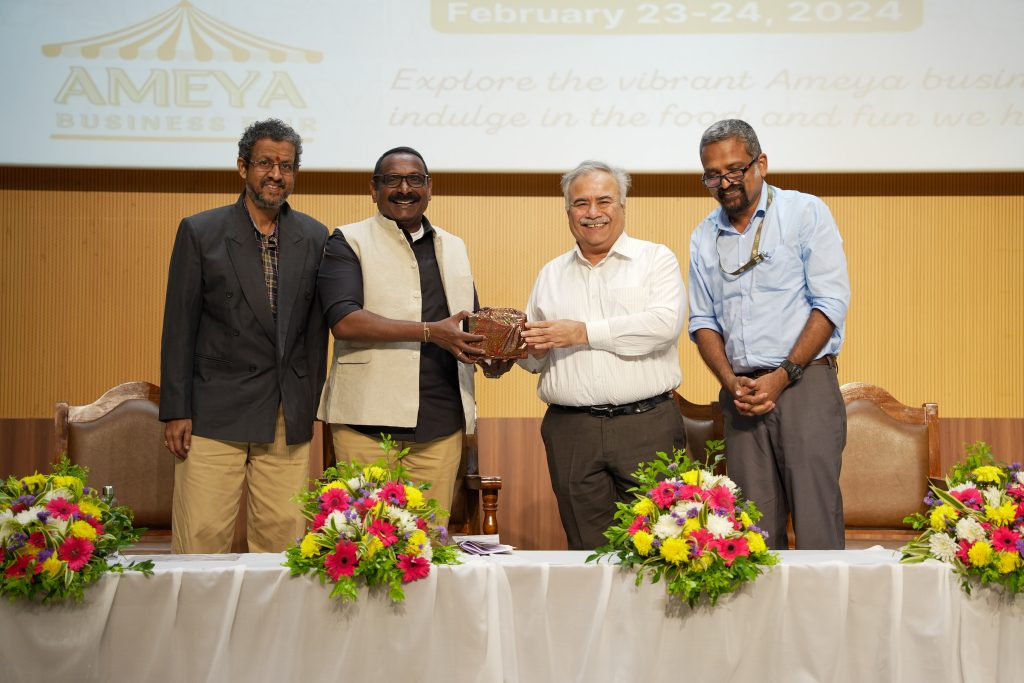
In the heart of the evolving business landscape, the Paari School of Business at SRM University-AP hosted the national-level business fest, Ameya ’24, a beacon of excellence and innovation, on February 23-24, 2024. This pioneering event, co-sponsored by Amyra Silver, was a crucible of ideas, leadership, and entrepreneurial spirit, attracting over 500 participants from 25 distinguished institutions.
The fest was inaugurated by an illustrious panel comprising Dr Bhanu Prakash Reddy Varla, a vanguard of entrepreneurship and chair of TiE Grad; Prof. Manoj K. Arora, the visionary Vice-Chancellor of SRM University-AP; Prof. Bharadhwaj Sivakumaran, Dean of Paari School of Business; and Prof. Vishnupad, Dean of Easwari School of Liberal Arts. Their presence underscored the fest’s commitment to blending academic rigour with real-world business acumen.
Empowering the Future: Leadership and Learning
Ameya ’24 was more than an event; it was a dynamic platform designed to instil leadership, team-building, and ethical decision-making skills among students. Prof. Manoj K. Arora highlighted the university’s dedication to offering experiences beyond traditional curricula, aiming to nurture a generation of dynamic entrepreneurs and professionals through unique courses such as Samaj Seva, Mind and Soul Training, and Happening Happenings.
A Journey of Inspiration: Dr Varla Bhanu Prakash Reddy
The chief guest, Dr Varla Bhanu Prakash Reddy, in his motivational address, shared his entrepreneurial odyssey, emphasising the importance of focus, skill accumulation, and horizon-broadening during graduate studies. Dr Reddy’s vision of an “Unstoppable India” leading the global economy, underscored by the rise of Indian unicorns, was a rallying call for students to become innovators and job creators, armed with SWOT analysis and upskilling from their student life.
A Kaleidoscope of Competitions
Ameya ’24 unveiled a spectrum of competitions designed to challenge and inspire:
Stock Pulse: A thrilling online stock simulation that tested participants’ investment strategies. Jainam R Jain from Nalanda Vidya Niketan bagged the first prize in this segment.
Product Palooze: A creative marketing challenge where teams devised unique selling propositions for randomly picked products. Praveen from Laki Reddy Bali Reddy College of Engineering became the winner.
Biz Wiz: A business quiz that spanned various domains, from CEO Showdown to Rapid-Fire rounds, engaging teams in a test of knowledge and wit. The winner of this competition was Venkata Yashwith Chakirala from Nalanda Vidya Niketan.
Elevator Pitch: An intense competition where individuals pitched fictional startups, showcasing their strategic thinking and persuasion skills. Shreeyash from SRM University-AP secured the winner rank in this one.
HR Odyssey: A deep dive into the future of Human Resource Management, with simulations and debates to test participants’ innovative HR solutions. Meghana from the Gates Institute of Management received the winning trophy in the competition.
Data Dynamo: A challenge that highlighted the importance of data visualisation and business intelligence, culminating in a real-world case study competition. Polavarapu Priyansha from SRM University-AP bagged the winning trophy in this segment.
IPL Auction Spectacle: A strategic game of cricket team building within a simulated budget, engaging participants in the intricacies of player selection and financial management. The winning position was secured by Suresh and Team from PB Siddhartha College of Arts and Science.
The business fair, a simulation of entrepreneurship, allowed students to experience the journey of setting up and managing a business through innovative kiosks, further enriching their learning experience.
Cultural Vibrance and Legacy
The fest also celebrated cultural heritage, with Chenda Melam captivating the audience, and a vibrant cultural evening of dance and music marking the conclusion of Ameya ’24. This fusion of business acumen and cultural celebration underscored the holistic development fostered at the event.
Ameya ’24 was not just an event but a milestone in the journey of future business leaders. It was a testament to the power of collaboration, innovation, and vision in shaping the entrepreneurs of tomorrow. As participants departed, they carried with them not just the memories of competition and camaraderie but the spark to ignite their paths and contribute to an unstoppable India. This fest has truly set a benchmark for fostering a dynamic generation of entrepreneurs and professionals ready to take on the world’s business stages.
- Published in Departmental News, News, Paari Current Happenings, paari-events
Aadigyan: Connecting Cultures and Celebrating Diversity
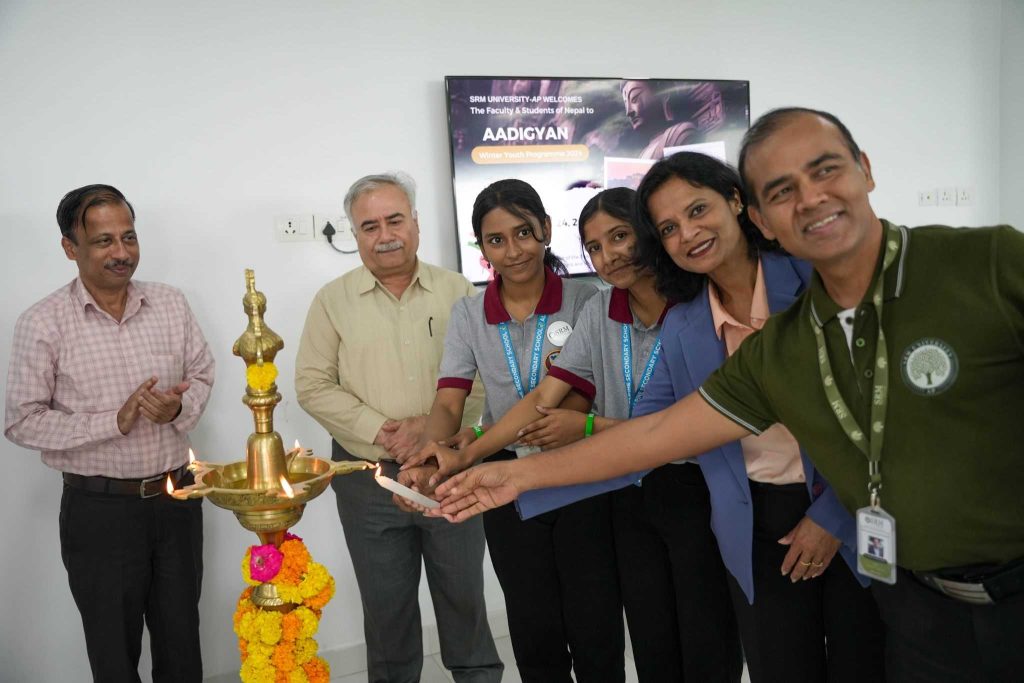
The Directorate of International Relations and Higher Studies (IR&HS) at SRM University-AP has organised Aadigyan Winter Youth Programme. The event is the varsity’s flagship initiative and is conducted to introduce International students and to familiarise them with the Indian culture, its history and lifestyle. This year the varsity hosted students and faculty from Alpine High School, Nepal. The event, which spanned over three days, saw students engage in the world of knowledge and innovation.
The induction featured Vice Chancellor, Prof. Manoj K Arora, Deans, Assistant and Associate Deans of the three schools, and Directors and other luminaries. The event highlights included insightful sessions on engineering, liberal arts, and a unique experimental workshop, “Walk with a Scientist”, that saw Prof. Jayaseelan Murugaiyan introduce the students to the vast diversity of flora and fauna on the campus.
The third day of the Aadigyan Youth Programme saw the students attend insightful sessions by luminaries such as Prof. A V S Kamesh, Professor Paari School; Mr Sidharth Shankar Tripathy, Director Entrepreneurship and Innovation; Ms Kriti Gopal Das, ISKCON and finally Ms Aditi Jain, Director-IR&HS.
- Published in Departmental News, IR-News, News
Young Investors Workshop for Management Graduates
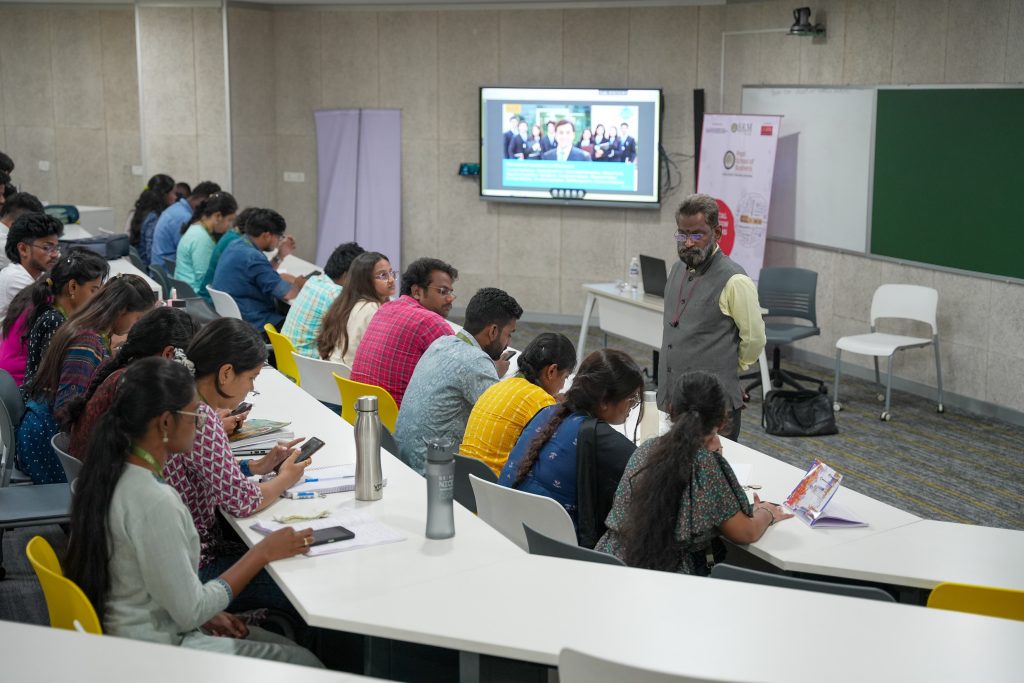
The Paari School of Business has organised a transformative two-day Young Investor Education Workshop on “Financial Education for Young Citizens” for MBA students on February 26-27, 2024, led by finance expert Dr Vijaya Kumar Chilukuri from NISM. The sessions covered diverse finance intricacies and career strategies. Certificates were awarded to participants who cleared the examination, adding value to their academic journey. A Pre-assessment and post-assessment were conducted, which helped students understand their learning journey. Dr Chilukuri’s expertise and his interactive sessions left a lasting impact on all the students, and they actively participated in learning many key concepts of savings and investments. These workshops conducted by the school align with SRM AP’s commitment to holistic education and student success.
- Published in Departmental News, News, Paari Current Happenings, paari-events


